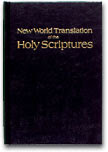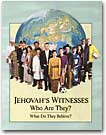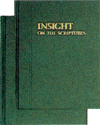The only two times that Agabus is mentioned both occur in the Bible book of Acts. He makes his first appearance in Chapter eleven. We read: "Now in these days prophets came down from Jerusalem to Antioch. One of them named Agabus rose and proceeded to indicate through the spirit that a great famine was about to come upon the entire inhabited earth; which, for that matter, did take place in the time of Claudius."-Acts 11:27-28
Agabus was a holy prophet, which shows that he was a very good man. Jehovah didn't just give that responsibility to anyone. Sure, after receiving holy spirit in those days, people would speak in tongues or display some other gift from the spirit but they were generally not considered prophets. The very fact that Agabus was a known prophet shows us that he had been a worshiper of Jehovah God for a long time. In fact, in the Roman Catholic Church and "Eastern Christianity"* he is regarded as a saint. Church tradition holds him as one of the seventy disciples sent forth by Christ at Luke 10:1, although this cannot be verified by the Holy Scriptures.[1]
The prophecy that Agabus made was fulfilled in 45 C.E. during the time of Claudius. However, we find that, because of Agabus' prophecy "those of the disciples determined, each of them according as anyone could afford it, to send a relief ministration to the brothers dwelling in Judea; and this they did, dispatching it to the older men by the hand of Barnabas and Saul." (Acts 11:29-30) Agabus was respected and taken seriously. Due to his faithfulness and prophecy, many of our first-century Christian brothers and sisters were well taken care of. All of this occurred before 45 C.E., just as Agabus stated.
The second time that Agabus is mentioned in the Scriptures is towards the end of the book of Acts, prophesying again. He gave this prophecy in Caesarea: "A certain prophet named Agabus came down from Judea, and he came to us and took up the girdle of Paul, bound his own feet and hands and said: 'Thus says the holy spirit, "The man to whom this girdle belongs the Jews will bind in this manner in Jerusalem and deliver into the hands of people of the nations."'-Acts 21:10-11
Both times, Agabus is stated as traveling from Judea to wherever Paul was. It can thus be assumed that Agabus resided in Judea, possibly even in Jerusalem. If this was the case, then Agabus had plenty of opportunities to show his love of Jehovah God. Many things happened to the Christian Jews in Jerusalem. Herod began to persecute the Christian congregation. He killed the Apostle James with the sword. He even arrested the Apostle Peter. (Acts 12:1-5) Through all of this persecution, Agabus stayed strong, undoubtedly being a great source of encouragement to the local brothers.
Even before all of that, if Agabus was already a Christian, he had to endure the opposition from fellow Jews with the other brothers when it became clear that Gentiles were now allowed to be followers of Christ. (Acts 11:1-3) If Brother Agabus was actually a follower of Christ when the Messiah was on earth as the Catholic Church believes, then he had even more opposition immediately following the Lord's death. Things were tough for the disciples, including possibly Agabus, in those days.-John 20:19, 26
We can only assume that Agabus remained steadfast in the Truth up until his death, whenever that was. Surely, his brief mention in this Scriptures testifies to that. But what can we learn from Brother Agabus?
Just like when he traveled all that distance from Jerusalem to Antioch, we can go wherever Jehovah wants us to, as willingly as Agabus proved himself to be. Also, when under severe persecution, we can remain steadfast, relying on Jehovah and His spirit and our Head, Jesus. Finally, we should never let the fear of men bring us down. Surely, this courageous brother, although not mentioned very much in the Scriptures is a wonderful example for us today.-Romans 15:4
*"Eastern Christianity" is composed of the Assyrian Church of the East, the Eastern Orthodox Churches, the Oriental Orthodox Churches, and the Eastern Catholic Churches.
References
[1] "New Advent" Catholic Encyclopedia



























